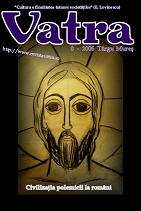


Keywords: spirit of polemics; Laszlo Alexandru - Ovidiu Pecican: Dialogues about Dante;
Investigation answering these questions: - Is there a tradition of polemics in the Romanian culture? - Which is the definition of polemic spirit, and which are the dominant characteristics of the polemic discourse? - Which are the truly representative polemicists of the Romanian culture, and which are the themes that developed consistent polemics? - is there now, a civilization of polemics in Romania?
More...
Keywords: creative writing; Jolan Benedek;
Essay argumenting the necessity of teaching creative writing in high schools and universities.
More...



The author explores the meaning and the philosophy of guilt.
More...
Keywords: european integration; Romania; Romanian history; orthodox religion; religious cultural issues and causes; exclusion of peasants; western "infiltrations" in the Romanian culture; Russian influence;
More...
Keywords: Jacques Lacan; psychanalysis;
More...
A few words about Marko Ivan Rupnik, whose drawings can be found in this issue of Vatra.
More...

Cristian Vasile (Istoria Bisericii Greco-Catolice sub regimul comunist. 1945-1989. Documente şi mărturii, Iaşi, Editura Polirom, 2003); Claudiu Komartin, Circul domestic, Editura Cartea Românească, Bucureşti, 2005, 80 p; Eugen Curta - Seducţia continuă (Editura Genesis, 2005); Daniela Raţiu - Ochelari de damă (2005), Editura Brumar.
More...
"Uraaaa! Bunica are un amant..." by Dumitru Huruba; "Cantata profana" by Kocsis Francisko.
More...
Keywords: straight talking; straight writing (literature);
More...
Keywords: Catholic Church; Communist Government; Croatian Religious Commission
This work examines the relationship between Bishop Akšamović and the Yugoslavian government in Yugoslavia, especially from 1945 until 1951, the year he went into retirement, but it also until 1959, the year of his death. It features his close relationship to the President of the Croatian Religious Commission, Svetozar Ritig, whom he turned to most for support for some of the requests he directed at the state. This work also singles out some of the petitions he sent to the government which clearly demostrate the problems the Bishop faced, and the way in which he attempted to solve them. Thanks to Ritig's support as well as his preparedness to establish a better working relationship with the government compared to the other Bishops, his petitions and requests met with more success than was common practice at the time.
More...Keywords: Baptist Church; British and Foreign Bible Society; Zagreb
The essay investigates the beginnings of the Baptist church in Zagreb in late nineteenth century through to 1922. Earliest influences came from the colporteurs sent by Britsh and Foreign Bible Society, from the graduates of St Chrischona missionary school in Switzerland, and from the Lutheran churches in Vienna and Budapest. The essay discusses the problems of precise dating of the founding of the Baptist church and the life and careers of two key individuals, Ivan Zrinšćak and Stjepan Bedeković,. It gives an outline of inetractions among significant individuals, missionary activity, and some relevant theological issues. Only a brief outline of the Baptist community is possible for the period of the First World War when the church almost ceased to exist, but was re-founded in the sbsequent three years. The essay makes use of primary sources, such as several letters exchanged between signficant church members dating from the end of the 19th century, as well as all existing secondary sources, and situates the study in the context of existent literature on Protestant/free church tradition denominations in the Croatian lands.
More...Keywords: Historiography; Historians; Memory
The author analyzes the devolopment of historiography in the past thirty years. She stresses her opposition to the predominant influence of ideology, and at the same time she questions the new directions and viewpoints in historical research and professional historiography.
More...Keywords: Zagreb Rescue Team; Institute for Urgent Medical Assistance; Zagreb
The author of this text provides an insight into how the Zagreb Rescue Team, an antecedent of Institute for Urgent Medical Assistance, was founded. He analyses the influence of social and economic conditions in Zagreb at the end of the nineteenth and the beginning of the twenthiet century.
More...Keywords: Religions Persecution; Communism; Yugoslavia; Stalinism
The author of this article examines religious persecutions which occured during the period from the time of the communist takeover of government at the end of the Second World War until 1953. She shows how at this time the Soviet model of purges was applied to Church circels. Using a comparative method, the author points out similarities with Stalin's pattern of rule, but also shows modifications in the relations between the government and religion, which come into view after Stalin's death (1953). The author concludes that Yugoslavian religious policies were less extreme in terms of persecution of religion in comparison to the Soviet Union. The more moderate Titoist regime was able to control the work of Churc organizations and to produce propaganda about the ostensible freedom of religion in Yugoslavia.
More...